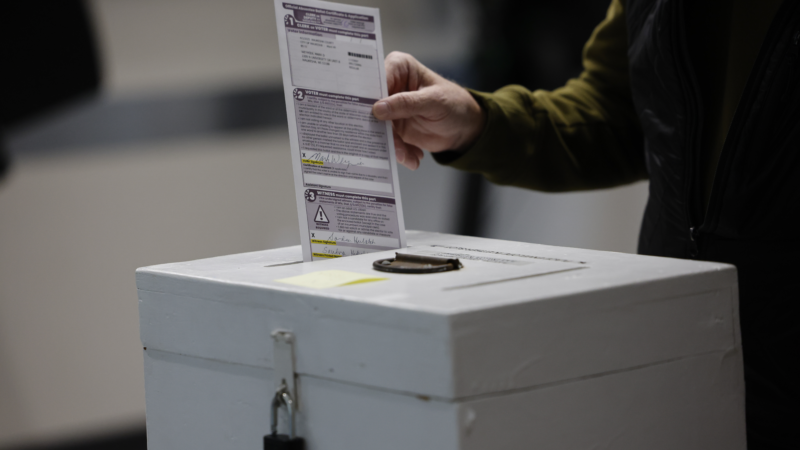Trump’s new executive order could upend voting
President Donald Trump has signed a new executive order that would require prospective voters to show proof of citizenship to register to vote. The order’s sweeping changes test the power of Trump’s presidential authority.
Voting rights advocates worry the new provisions could block millions of Americans from voting if enacted, and say Trump lacks the legal authority to make such changes.
The order claims the United States “fails to enforce basic and necessary election protections.”
The order calls for updating the federal form voters can use to register to vote, to include a requirement that voters show proof of citizenship, like a passport, to a local or state official.
States have long had considerable leeway in how they manage their elections. The federal government has been able to set some minimum standards for federal races, though typically via legislation.
The order also requires states to remove noncitizens from voter rolls, calls for states and federal agencies to share data to prosecute election crimes, and grants federal agencies, including to the head of the Department of Government Efficiency team, access to check state rolls “for consistency with Federal requirements.” It also directs federal agencies to share data with states, such as immigration and Social Security records, to facilitate states checking the eligibility of the names on their voter rolls.
Voting rights advocates, however, warn outdated databases can erroneously list naturalized citizens as noncitizens. Past efforts by states to purge noncitizens from voter rolls have sometimes swept up eligible U.S. citizens.
The executive order also seeks to stop states from counting mail or absentee ballots received after Election Day by withholding funding from states that allow such ballots to be counted.
Proof of citizenship requirement
Ahead of the 2024 election, Trump and his allies made baseless claims about the threat of noncitizens voting in large numbers.
The current federal voter registration form asks registrants to swear, under penalty of perjury, that they are U.S. citizens and eligible to vote, and to provide a driver’s license number, state ID number or social security number. Those who attempt to vote illegally can face prison time, fines or deportation. Past audits and studies have shown such cases are incredibly rare.
Yet Republicans have made requiring documentary proof of citizenship a policy priority. The executive order borrows heavily from the Safeguard American Voter Eligibility Act, known as the SAVE Act, a Republican-backed bill. House Republicans have signaled that they intend to pass it in their chamber but it faces difficult odds in the Senate.
The executive order shows Trump isn’t waiting for Congress. But legal experts say that he does not have the authority through executive order to make such changes, and the order conflicts with existing federal voting law.
“It’s illegal at many different levels,” said Sean Morales-Doyle, the voting rights director at the Brennan Center for Justice, a nonprofit that studies and advocates for voting rights. The order directs the Election Assistance Commission, a small, independent bipartisan agency, to make various changes, including to the federal voter registration form, but Morales-Doyle said the president can’t tell that commission what to do.
Requiring documentary proof of citizenship would radically upend voter registration if such a mandate were to take effect.
The order is explicit that applies to anyone who uses the federal voter registration form. What is less clear is if the order would also pressure states to require showing proof of citizenship with state registration forms, such as by withholding funds.
The order only lists a limited number of ways to prove U.S. citizenship. The options given are a U.S. passport, an ID that complies with the REAL ID Act that shows citizenship, or a military ID that shows citizenship. A fourth option is a valid government photo ID that “indicates that the applicant is a United States citizen or if such identification is otherwise accompanied by proof of United States citizenship,” but does not say if a birth certificate would count.
Morales-Doyle said the fact that birth certificates are not explicitly mentioned in the order as a way to prove citizenship are consistent with another Trump order that ends birthright citizenship.
Only about half of Americans have a U.S. passport, and only five states currently offer enhanced driver’s licenses that show proof of citizenship.
Rideshare union rights, social media limits and other state laws taking effect Jan. 1
Every new year, public media reporters across the country bring us some of the new state laws taking effect where they are. Here are six in 2026.
Guides to help you tackle your New Year’s resolutions
From building your strength to tackling credit card debt, NPR's Life Kit has a newsletter journey to help you tackle your New Year's resolution.
Guides to help you tackle your New Year’s resolutions
From building your strength to tackling credit card debt, NPR's Life Kit has a newsletter journey to help you tackle your New Year's resolution.
Dozens presumed dead in fire at Swiss Alps bar during New Year’s celebration
Dozens of people are presumed dead and about 100 injured, most of them seriously, following a fire at a Swiss Alps bar during a New Year's celebration, police said Thursday.
Warren Buffett officially retires as Berkshire Hathway’s CEO
The legendary 95-year-old investor spent decades building his company into one of the world's largest and most powerful. Now Greg Abel is taking it over.
Crypto soared in 2025 — and then crashed. Now what?
For most of 2025, cryptocurrencies such as bitcoin surged as President Trump vowed to make the U.S. a crypto leader. But now, a severe sell-off has shaken the sector.






